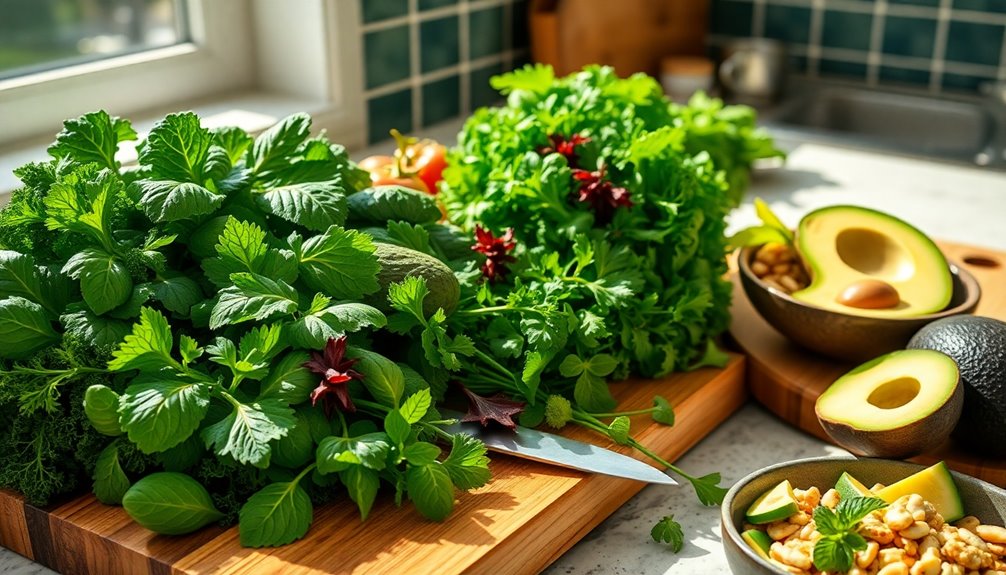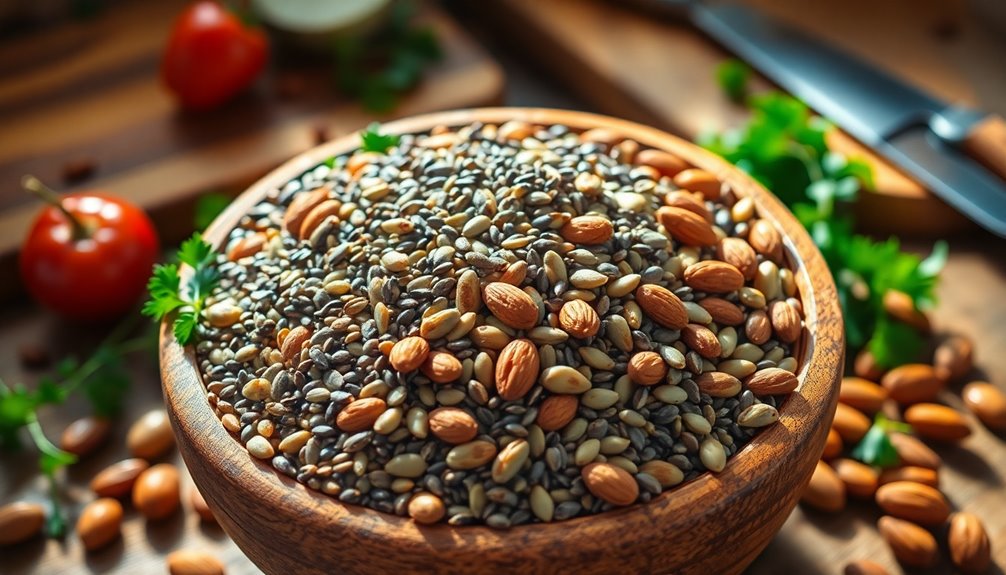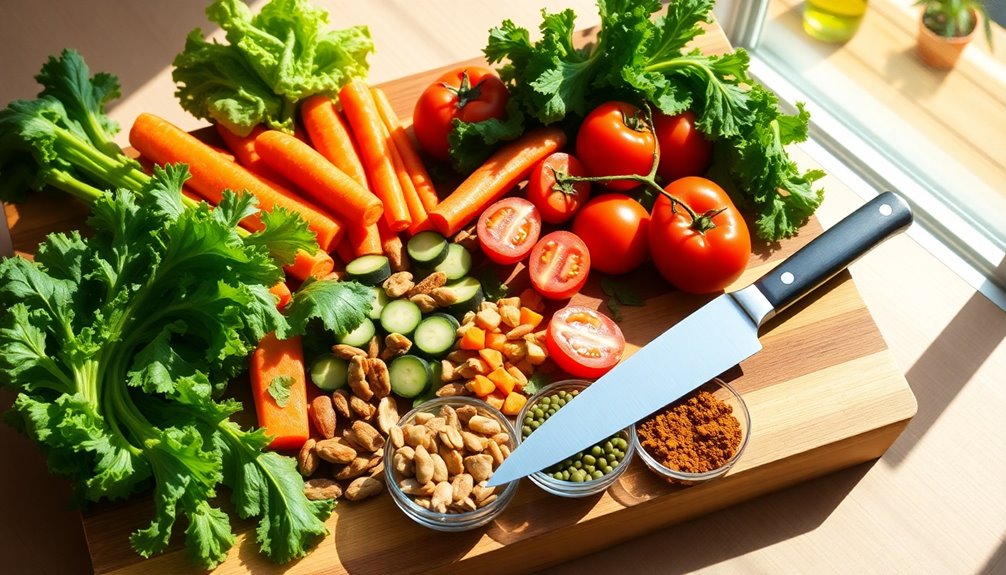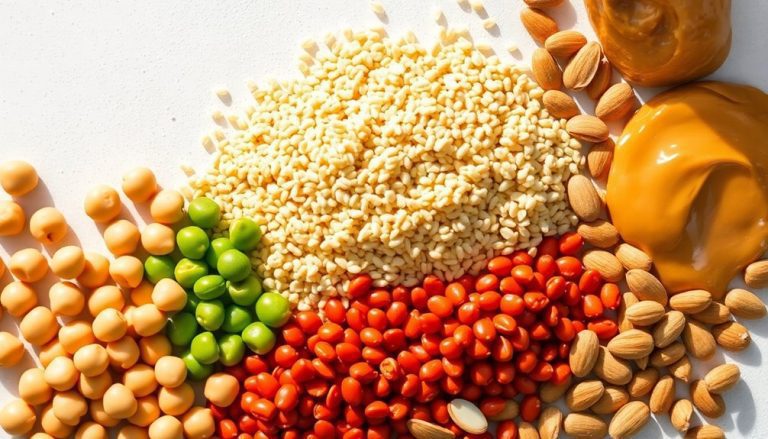You can easily boost your meals with micronutrients by incorporating leafy greens, nutritious spices, and seeds or nuts. Leafy greens like spinach and kale are packed with vitamins and can be added to salads or smoothies. Nutritious spices, such as turmeric and cinnamon, not only enhance flavor but also offer health benefits. Lastly, add seeds and nuts for extra vitamins and healthy fats—think chia seeds for heart health or almonds for skin benefits. Mix and match these ingredients to keep your meals exciting while maximizing nutrition. There's more you'll discover about enhancing your diet and meals!
Key Takeaways
- Incorporate a variety of leafy greens into meals, such as salads and smoothies, for a rich source of vitamins and minerals.
- Use nutritious spices like turmeric and cumin to enhance flavor while providing anti-inflammatory and health benefits.
- Sprinkle seeds and nuts onto dishes for added texture, healthy fats, and essential vitamins and minerals.
- Rotate different types of greens and spices regularly to maximize health benefits and keep meals interesting.
- Grow an indoor herb garden to ensure fresh access to herbs, enhancing flavor and nutrition in your meals.
Incorporate Leafy Greens

Incorporating leafy greens into your meals is one of the easiest ways to boost your nutrient intake. These vibrant vegetables are packed with vitamins, minerals, and antioxidants that promote overall health. You can easily add spinach, kale, or Swiss chard to salads, smoothies, or stir-fries.
When you blend spinach into your morning smoothie, you won't even taste it, yet you'll gain a significant nutrient boost. Tossing some kale into a stir-fry not only enhances the dish's flavor but also increases its fiber content. Additionally, using fresh herbs from your indoor herb garden can further enhance the nutritional profile of your meals.
Don't forget about using greens as a base for your meals. Instead of traditional rice or pasta, try a bed of sautéed greens topped with your favorite protein. This can elevate your dish while keeping it light and nutritious.
Experiment with different leafy greens to keep your meals exciting. Each variety offers unique nutrients, so rotating them can maximize your health benefits. Additionally, growing your own herbs and greens through a complete herb garden kit can ensure you have fresh ingredients on hand.
Whether you enjoy them raw, steamed, or sautéed, incorporating leafy greens into your diet is a simple yet effective way to enhance your micronutrient intake and support your well-being. Start today and feel the positive impact on your health!
Use Nutritious Spices
How can you elevate the flavor and health benefits of your meals effortlessly? One simple way is to use nutritious spices. These tiny powerhouses pack a punch of flavor and are loaded with essential micronutrients.
For instance, turmeric contains curcumin, known for its anti-inflammatory properties, while cumin adds iron to your diet. Incorporating spices like cinnamon can help regulate blood sugar, and ginger aids digestion. Just a dash can transform a bland dish into a culinary delight while boosting your health. Additionally, growing your own spices in a self-watering planter can ensure you have fresh herbs and spices on hand for all your culinary needs. Consider using a plant care kit to support your indoor gardening efforts.
Don't shy away from experimenting! Mix and match different spices to discover new flavor profiles and benefits. For example, a blend of garlic powder and paprika not only enhances taste but also introduces antioxidants into your meals.
Remember to keep your spices fresh, as their potency diminishes over time. Store them in airtight containers away from light and heat for maximum flavor.
Add Seeds and Nuts

To further boost the nutritional value of your meals, consider adding seeds and nuts. These tiny powerhouses are packed with vitamins, minerals, healthy fats, and protein. They not only enhance flavor and texture but also contribute beneficial micronutrients that support overall health. Additionally, choosing high-quality plant food online can help ensure that you're maximizing the nutrients in your meals.
Here's a quick comparison of some popular seeds and nuts along with their key nutrients:
| Seed/Nut | Key Nutrient | Benefits |
|---|---|---|
| Chia Seeds | Omega-3 Fatty Acids | Supports heart health and reduces inflammation. |
| Flaxseeds | Lignans | May help reduce cancer risk and improve heart health. |
| Almonds | Vitamin E | Acts as an antioxidant and supports skin health. |
| Walnuts | Antioxidants | May improve brain health and reduce oxidative stress. |
| Sunflower Seeds | Magnesium | Supports muscle and nerve function, and boosts energy. |
You can sprinkle seeds and nuts on salads, yogurt, or blend them into smoothies. They're also great as snacks on their own. By incorporating these nutritious additions, you'll elevate your meals while reaping numerous health benefits. So, grab some seeds and nuts today!
Frequently Asked Questions
How Can I Ensure a Balanced Intake of Micronutrients?
To ensure a balanced intake of micronutrients, focus on incorporating a variety of colorful fruits and vegetables into your meals, choose whole grains over refined ones, and consider diversifying your protein sources for optimal nutrition.
What Are the Best Sources of Micronutrients for Vegetarians?
Imagine a garden blooming with colors; that's your plate as a vegetarian. Leafy greens, nuts, seeds, legumes, and whole grains are treasure troves of micronutrients. Embrace these vibrant foods, and watch your health flourish.
Can Cooking Methods Affect Micronutrient Levels in Food?
Yes, cooking methods definitely affect micronutrient levels in food. Steaming often preserves more nutrients compared to boiling, while frying can lead to significant losses. You should choose cooking techniques that maintain the nutritional integrity of your meals.
How Do I Store Foods to Preserve Their Micronutrient Content?
"An apple a day keeps the doctor away." To preserve micronutrients, store foods in cool, dark places. Use airtight containers, and avoid plastic wrap. Refrigerate perishables promptly, and consume them fresh to maintain their nutrient content.
Are There Any Supplements for Micronutrient Deficiencies?
Yes, there are supplements for micronutrient deficiencies. You can choose multivitamins or specific vitamins and minerals based on your needs. Always consult a healthcare professional before starting any supplement regimen to ensure it's right for you.
Conclusion
Incorporating micronutrients into your meals can be as simple as tossing a handful of spinach into your morning smoothie, sprinkling turmeric on your roasted veggies, or adding a mix of chia seeds and walnuts to your yogurt. Imagine starting your day with a vibrant green smoothie packed with leafy greens, a dash of spice, and a crunchy topping. You'll not only boost your nutrient intake but also enhance the flavor and texture of your meals. Enjoy every bite!




